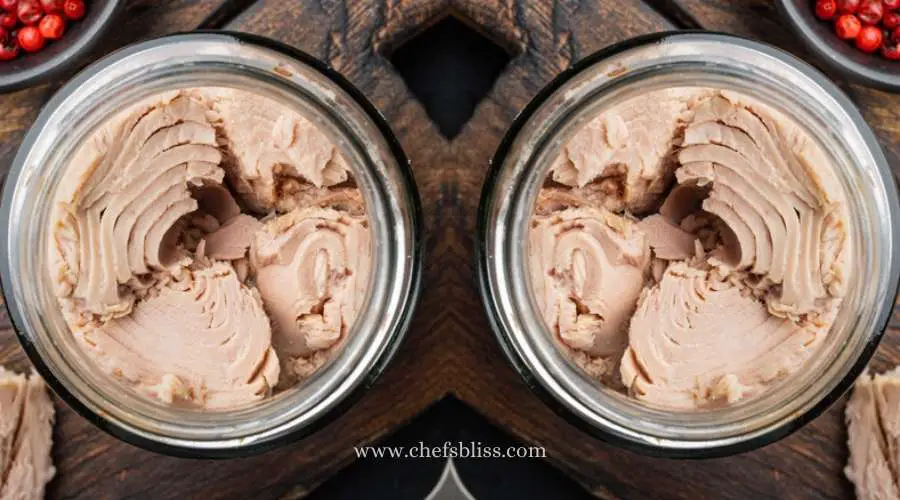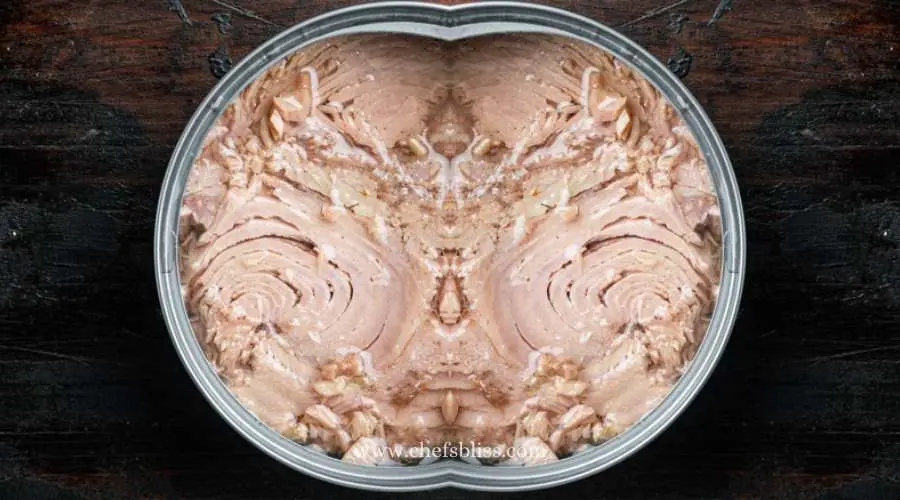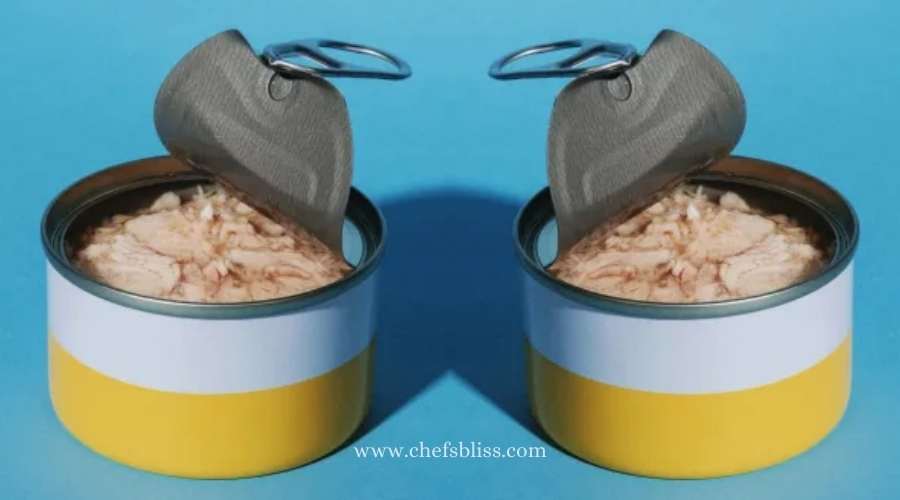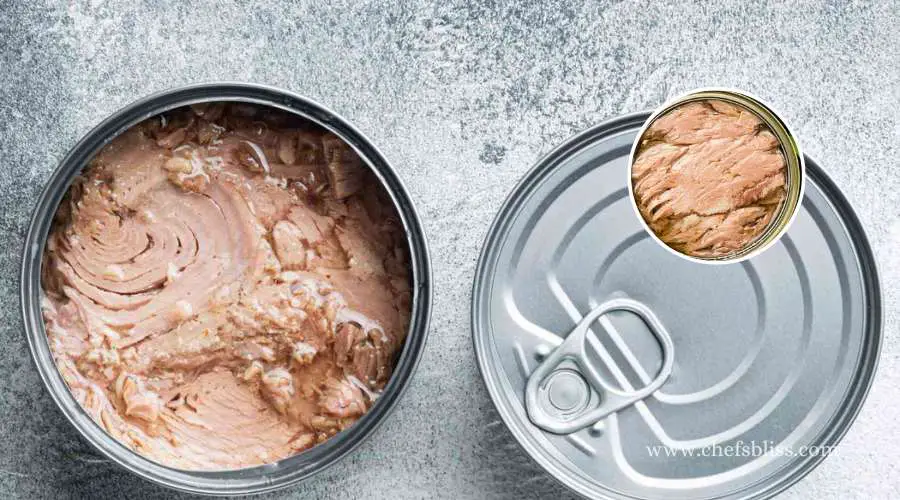Every product is independently reviewed and selected by our editors. If you buy something through our links, we may earn an affiliate commission at no extra cost to you.
On a hot day, it’s not uncommon for people to leave various items in their cars while running errands or going about their day. However, one item that you should be cautious about leaving in a hot car is canned tuna.
In this article, I will explore the potential risks and consequences of leaving canned tuna in a hot car and provide tips on how to ensure food safety.
Can Canned Tuna Be Left In Hot Car – Get the answer
No, you can not leave canned tuna in a hot car for an extended period. The high temperatures inside a hot car can potentially affect the quality and safety of canned tuna.
Here are some reasons why you should avoid leaving canned tuna in a hot car:
Temperature Fluctuations
Extreme heat can cause the temperature inside a car to rise significantly. Canned tuna, like other canned foods, is best stored at a stable, cool temperature.
Frequent temperature fluctuations can lead to changes in texture, taste, and even spoilage over time.

Can Integrity
Cans are designed to provide a protective barrier against contaminants. However, excessive heat can weaken the integrity of the can, potentially leading to leaks or damage that could expose the tuna to air and bacteria, increasing the risk of spoilage.
Quality and Taste
Prolonged exposure to high temperatures can lead to changes in the quality and taste of the canned tuna. It may become mushy or develop an off-putting flavor.
Nutrient Loss
Heat can cause the loss of essential nutrients in canned tuna, reducing its nutritional value.
Safety Concerns
In rare cases, extreme heat can cause the contents of the can to expand and potentially rupture the can. This can pose safety hazards, including the risk of injury if the can explodes.
Also Read: Can Canned Food Be Left In Hot Car? (Answered)
How to tell if canned tuna is bad in a hot car?
Determining whether canned tuna left in a hot car has gone bad involves examining several factors.

Here are some signs to look for to assess the condition of canned tuna that has been exposed to high temperatures:
Inspect the Can: Start by examining the can itself. Look for any visible damage, such as dents, bulges, or rust. If the can is compromised, it may indicate a potential issue with the contents.
Check for Leaks: Check if there are any signs of liquid or moisture around the can. If the can has leaked, it’s a clear indicator that the contents may have been exposed to air and bacteria, potentially leading to spoilage.
Smell: Open the can and take a sniff. If the canned tuna has an unusual or off-putting odor, it’s a strong indication that it has gone bad. Canned tuna should have a mild, seafood-like aroma.
Texture: Examine the texture of the tuna. If it feels excessively mushy, slimy, or has an unusual consistency, it may be a sign of spoilage.
Color: Canned tuna is typically a pale pink to beige color. If you notice any unusual discoloration, such as a gray or brown hue, it could indicate spoilage.
Taste: If you’re comfortable doing so, you can taste a small amount of the canned tuna. If it has a foul or off flavor, it’s a clear indication that it is no longer safe to eat.
Expiration Date: Check the expiration or “best by” date on the can. If the canned tuna is past its expiration date, it may be more prone to spoilage, especially if it has been exposed to heat.
Packaging Integrity: Ensure that the lid or seal of the can is securely in place. If the seal is compromised or if the lid is loose, it could be a sign of spoilage or contamination.

If you observe any of these signs or have any doubts about the safety or quality of the canned tuna, it’s best to err on the side of caution and discard it.
Eating spoiled canned food can lead to foodborne illness, so it’s important to prioritize safety when evaluating food that has been exposed to adverse conditions like extreme heat.
Also Read: Can Unopened Mayonnaise Be Left In A Hot Car? Answered
Can tuna packets get hot in a car?
Yes, tuna packets can get hot in a car if they are exposed to high temperatures. Just like canned tuna, tuna packets are also sensitive to extreme heat.
If left inside a hot car on a hot day, the temperature inside the car can rise significantly, potentially causing the tuna packets to become quite hot.
How long does canned tuna last in hot car?
The duration canned tuna can last in a hot car without spoiling can vary depending on several factors, including the temperature inside the car, the specific conditions, and the initial quality of the tuna.
Let’s have a loot at this table –
| Temperature (°F/°C) | Time in Hot Car (Approximate) | Amount of Canned Tuna |
|---|---|---|
| 70°F (21°C) | Several hours to a day | Small amount |
| 90°F (32°C) | A few hours | Small amount |
| 110°F (43°C) | A few hours | Small amount |
| 130°F (54°C) | Less than an hour | Small amount |
| 150°F (65°C) | Less than 30 minutes | Small amount |
| 70°F (21°C) | Several hours to a day | Large quantity |
| 90°F (32°C) | A few hours | Large quantity |
| 110°F (43°C) | A few hours | Large quantity |
| 130°F (54°C) | Less than an hour | Large quantity |
| 150°F (65°C) | Less than 30 minutes | Large quantity |
What happens if I forget a can of tuna in my car on a hot day?
If you forget a can of tuna in your car on a hot day, several things can happen due to the high temperatures inside the car:

Extreme heat can alter canned tuna’s texture and taste, making it mushy or unpleasant. Nutrient loss can occur, reducing its nutritional value. High temperatures can weaken can integrity, potentially causing leaks or damage.
Spoilage is possible, evident through odor, texture, or discoloration. In rare instances, extreme heat may cause can rupture, posing safety risks like explosions.
Also Read: Can Unopened Juice Be Left In A Hot Car? Answered
What are the risks of eating canned tuna that has been stored in a hot car?
Eating canned tuna that has been stored in a hot car, especially for an extended period, can pose several risks to your health and safety. These risks include:
Eating canned tuna that has been stored in a hot car poses several risks to your health and safety. These risks include spoilage, bacterial growth, nutrient loss, safety hazards, and potential health effects such as foodborne illness.
How to store canned tuna in a hot car?
Storing canned tuna, or any food, in a hot car for an extended period is not recommended, as it can compromise the quality and safety of the product.
However, if you must temporarily transport canned tuna in a hot car for a short duration, here are some tips to minimize the potential negative effects:
Keep It Cool: Whenever possible, place the canned tuna inside a small cooler with ice packs or frozen gel packs. This will help maintain a cooler temperature around the tuna and reduce the impact of the heat.
Use Insulation: Wrap the canned tuna in a towel or thermal insulation to create an additional barrier against the heat.
Shield from Direct Sunlight: Ensure that the canned tuna is not exposed to direct sunlight. Use sunshades or cover the cans with a dark cloth to block out sunlight and reduce heat absorption.
Limit Exposure: Minimize the time the canned tuna spends in the hot car. If you’re running errands, complete them quickly to reduce the exposure of the tuna to high temperatures.
Check for Damage: After removing the canned tuna from the hot car, inspect the cans for any visible damage, including dents, bulges, or signs of leakage. If you notice any damage or if the cans feel excessively hot, consider discarding them.
It’s essential to prioritize the safety and quality of your food, and in general, it’s best to avoid leaving perishable items like canned tuna in a hot car for extended periods.
To ensure the long-term quality and safety of canned tuna, store it in a cool, dry place at home, away from direct sunlight and temperature extremes.
Conclusion
While canned tuna is a convenient and nutritious food choice, it’s essential to prioritize food safety by avoiding prolonged exposure to extreme heat. Leaving canned tuna in a hot car can lead to changes in taste, texture, nutrient loss, can integrity issues, and even safety hazards. To enjoy the full benefits of canned tuna, store it properly in a cool, dry place, and be cautious when transporting it in hot weather. Your health and the quality of your meals are worth the extra care.
References
- https://extension.oregonstate.edu/ask-extension/featured/canned-food-safety-during-heat-wave
- https://ask.usda.gov/s/article/If-canned-goods-freeze-accidentally-are-they-safe
- https://www.consumerreports.org/food-safety/keep-groceries-food-safe-in-hot-car/
- https://www.mashed.com/793356/heres-how-long-canned-tuna-actually-lasts/
- https://www.allrecipes.com/mistakes-to-avoid-when-storing-canned-tuna-7693202
- https://www.healthline.com/nutrition/is-canned-tuna-healthy

